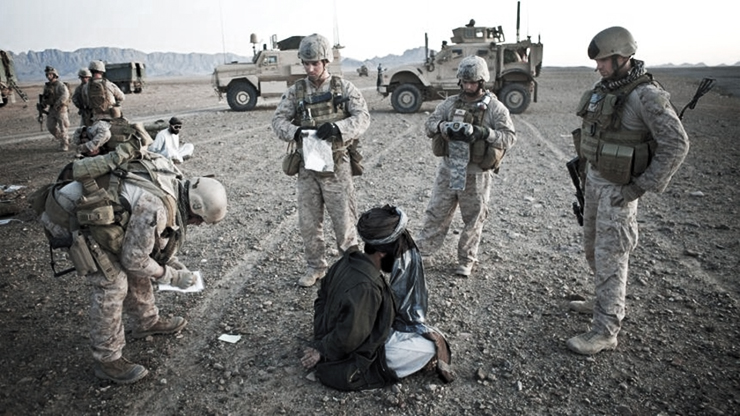While the US war in Afghanistan is reaching its end after almost two decades of fighting, it is becoming increasingly apparent that the US ‘war on terror’, while it fought the Taliban, did produce its own peculiar form of terrorism in the shape of war crimes and virtually unaccountable use of force on hundreds and thousands of innocent Afghan citizens. Countless instances of the US army’s indulgence in extra-judicial killings notwithstanding, the mercenaries the US unleashed on Afghanistan seem to have played an equally big role in relentlessly using force on common people. The US president’s recent decision to sanction the International Criminal Court investigation into potential US war crimes speaks volumes about the fact that there is a lot more to the Afghan war than meets the eye and that the Taliban, al-Qaeda and even the Islamic State are not the only killing machines that the common Afghans have faced in past two decades or so.
An institutional use of force on the Afghans by the Americans did not only play a role in further radicalising the Afghans and sustain the war for two decades, it also seems to have irreparably damaged—in fact exposed—the US’ largely self-arrogated role as ‘the champion’ of human rights.
Even the US’ closest ally, the United Kingdom, has distanced itself from the US policy of blocking the inquiry and arm-twisting the ICC. In an otherwise a strongly worded statement—which adds to the already growing distance between the US and Europe—the British foreign secretary said “The UK strongly supports the International Criminal Court in tackling impunity for the worst international crimes.” He added, with an eye on Trump’s Executive Order, “We will continue to support positive reform of the court, so that it operates as effectively as possibly. ICC officials should be able to carry out their work independently and impartially, and without fear of sanction.” In other words, the UK does not agree with the US that the latter’s vicious legacy need not be investigated and made public.
For Trump, such an investigation into war crimes, inhuman torture, and rape at this particular juncture of time would have severe consequences for his re-election bid. It is because plenty of evidence already exists that points to a seriously negative outcome for the US. The incumbent government will, of course, have to deal with it and, in fact, bear the political brunt as well.
A 2016 ICC report on ‘Preliminary Examination Activities’ showed the occurrence of “War crimes of torture and related ill-treatment, by US military forces deployed to Afghanistan and in secret detention facilities operated by the Central Intelligence Agency, principally in the 2003-2004 period, although allegedly continuing in some cases until 2014.” The report further said that “Members of US armed forces appear to have subjected at least 61 detained persons to torture, cruel treatment, outrages upon personal dignity on the territory of Afghanistan between 1 May 2003 and 31 December 2014.”
What concerns the US authorities the most is the fact that the ICC investigation found out that the instances of torture and war crimes were not a result of some ‘mentally unstable’ individuals, but a result of a concerted policy followed by the US military and security personnel. To quote it, “These alleged crimes were not the abuses of a few isolated individuals. Rather, they appear to have been committed as part of approved interrogation techniques in an attempt to extract ‘actionable intelligence’ from detainees.”
What adds credence to the ICC report is the fact that a number of other human rights organisations have repeatedly accused the US trained hit squads and the Pentagon contractors for indulging in potentially criminal activities.
The US administration, therefore, has an urgent task at hand to deal with. Accordingly, it is not surprising to note that Trump’s executive order treats officials of the ICC and their family members at par with potential and even actual terrorists. As it stands, the inclusion of family members is particularly notable because a 2019 Trump executive order to sanction terrorists did not include their family members.
An ICC inquiry at this particular stage can also have negative consequences for the on-going Afghan peace talks and can deal a severe blow to the smoke-screen of a ‘victorious exit’ the US seems to be carefully constructing for quite some tine now. That this investigation can have negative consequences for the US deal with the Taliban is evident from the way the Trump administration has termed it as a “foreign conspiracy” and how it is already courting the Russians into salvaging the talks and helping with kickstarting the stalled ‘intra-Afghan’ talks in order to secure their exit before the up-coming presidential elections and much before an ICC investigation.
This is particularly so because the US does not want to end up having to secure immunity for its security personnel at this particular moment of war in Afghanistan.
Salman Rafi Sheikh, research-analyst of International Relations and Pakistan’s foreign and domestic affairs, exclusively for the online magazine “New Eastern Outlook”.

